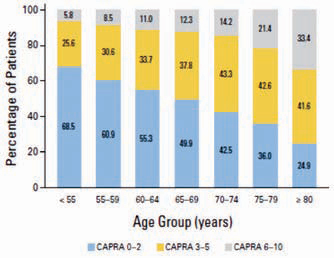PSA Screening Lessens Risk of Metastatic Cancer at Diagnosis
 Edward M. Messing, MD, FACS; Winfield W. Scott Professor, Chairman, Department of Urology, Professor of Oncology and Pathology, University of Rochester
Edward M. Messing, MD, FACS; Winfield W. Scott Professor, Chairman, Department of Urology, Professor of Oncology and Pathology, University of Rochester
Prostate cancer detected and treated early can result in a possible cure. Metastatic prostate cancer (cancer spread from the prostate to another part of the body) at diagnosis is unfortunately not curable.
Then, the only question is how long treatments will work to slow the progression.
Lowering Number of Cases
Clearly, anything that could lower the cases of metastatic prostate cancer at diagnosis is not only important but potentially life saving. A recent study* shows that PSA screening is one way to lower the percentage of metastatic prostate cancers at diagnosis. See our PSA FAQ.
The study concludes: “If pre-PSA era rates were present in the modern US population, then the total number of men presenting with metastatic prostate cancer would be approximately 3 times greater than the number actually observed.”
The study published in the journal Cancer had a goal to estimate the number of patients who would be expected to have metastatic prostate cancer at diagnosis in the PSA era, if they had been diagnosed without the benefit of PSA screening – as they would have before FDA approval of the PSA test. In addition, the authors broke down the data by age and race.
- 26% of men aged =75 diagnosed with highrisk disease in CaPSURE registry
- Older men: less local therapy, more primary hormonal therapy regardless of risk category
- These treatment differences appeared responsible for worse outcomes in older men
Older men: more high risk disease and less aggressive treatment worse CaP survival: Bechis et al. JCO 2011; 29: 235.
PSA Testing Helps
Dr. Edward Messing of the University of Rochester, who co-authored the study said, “Our data are very clear: Doing away with PSA testing will result in many men presenting with far more advanced prostate cancer. And almost all men with metastasis at diagnosis will die from prostate cancer.”
In addition, the study indicates that elderly men in particular will suffer if PSA testing is eliminated.
Messing pointed out that even now, men age 75 and over account for only 25% of all men diagnosed with prostate cancer; yet, almost half of those with metastases at diagnosis and over 50% of men who die from prostate cancer are first diagnosed when age 75 or older.
He noted that these figures would only increase if PSA screening were phased out.
In other words, many men who are diagnosed with prostate cancer at age 80 and who already have metastases might have been saved this fate if their cancers had been diagnosed 5, 10 or 15 years earlier, when the disease had not yet metastasized and curative treatment could have been given.
How Many Years Ahead
While not approving the PSA test in older men is a policy some advocate, Messing disagrees.
“It’s not how many years you’ve lived but how many years you have ahead of you,” Messing said when asked which older men should have the PSA test.
Since the average life expectancy of a healthy 75 or 80-year-old man is well over 10 years, he recommends testing for many men of that age.
Additionally, Messing recommends that otherwise healthy elderly men who have significant urinary symptoms should have a PSA test included in their evaluation. Prostate cancer’s symptoms may be identical to those of benign prostatic enlargement, but the treatments for each differ considerably, and the treatments for benign disease may interfere with those for prostate cancer.
“While it is true that many elderly men die with prostate cancer and not because of it, many also die because of it and many more will if the PSA test is withheld,” Messing said.
Elderly Benefit From PSA Testing
The study found that during the era when PSA testing became widely used: “…An absolute reduction in the incidence of presenting with metastatic prostate cancer increased with age until age 85 years; and, even in men aged 85 years, the absolute risk reduction was greater in magnitude than in most other age groups.”
In other words, elderly men particularly benefitted from PSA testing.
The study concludes: “… Preventing a presentation with metastatic prostate cancer among men of a given age was achieved by screening these men some years earlier.”
Also, the study concludes: “In 2008, approximately 8,000 men were diagnosed with metastases at time of detection. Using a mathematical model for expected occurrences in the absence of PSA testing, that number would have been 25,000.”
Price to Pay
“We’re going to pay quite a price if we don’t take these estimates into consideration when making public health policy recommendations for PSA screening,” Messing said.
* Prostate-Specific Antigen Screening for Prostate Cancer and the Risk of Overt Metastatic Disease at Presentation: Analysis of Trends Over Time; Emil Scosyrev, PhD; Guan Wu, MD, PhD; Supriya Mohile, MD; and Edward M. Messing, MD (Comparisons of current screening practices versus no screening was made using historic data from the SEER database – Surveillance Epidemiology and End Results of the National Cancer Institute.











